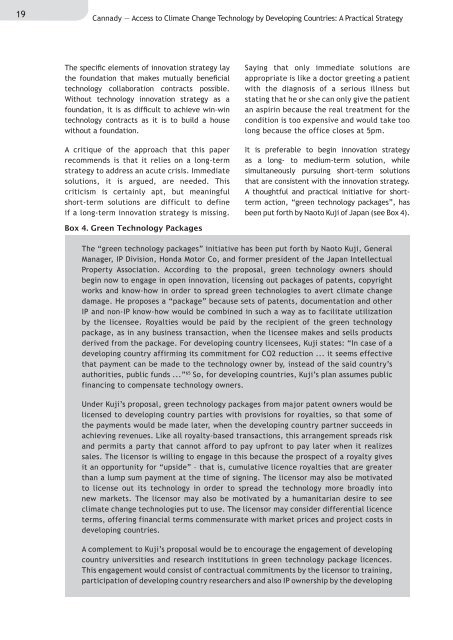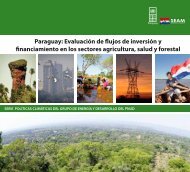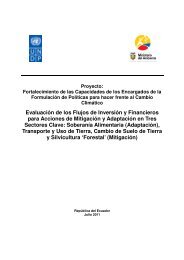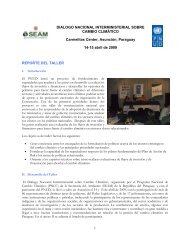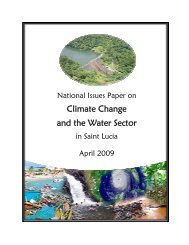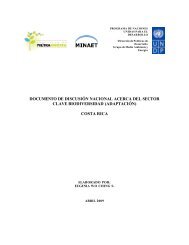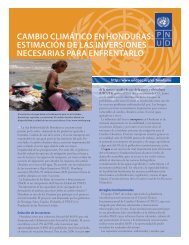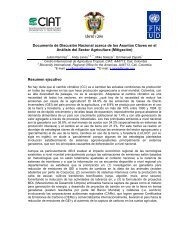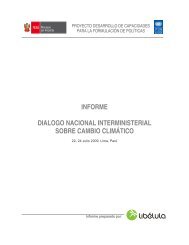View Publication - UNDPCC.org
View Publication - UNDPCC.org
View Publication - UNDPCC.org
You also want an ePaper? Increase the reach of your titles
YUMPU automatically turns print PDFs into web optimized ePapers that Google loves.
19 Cannady — Access to Climate Change Technology by Developing Countries: A Practical Strategy<br />
The specific elements of innovation strategy lay<br />
the foundation that makes mutually beneficial<br />
technology collaboration contracts possible.<br />
Without technology innovation strategy as a<br />
foundation, it is as difficult to achieve win–win<br />
technology contracts as it is to build a house<br />
without a foundation.<br />
A critique of the approach that this paper<br />
recommends is that it relies on a long-term<br />
strategy to address an acute crisis. Immediate<br />
solutions, it is argued, are needed. This<br />
criticism is certainly apt, but meaningful<br />
short-term solutions are difficult to define<br />
if a long-term innovation strategy is missing.<br />
Saying that only immediate solutions are<br />
appropriate is like a doctor greeting a patient<br />
with the diagnosis of a serious illness but<br />
stating that he or she can only give the patient<br />
an aspirin because the real treatment for the<br />
condition is too expensive and would take too<br />
long because the office closes at 5pm.<br />
It is preferable to begin innovation strategy<br />
as a long- to medium-term solution, while<br />
simultaneously pursuing short-term solutions<br />
that are consistent with the innovation strategy.<br />
A thoughtful and practical initiative for shortterm<br />
action, “green technology packages”, has<br />
been put forth by Naoto Kuji of Japan (see Box 4).<br />
Box 4. Green Technology Packages<br />
The “green technology packages” initiative has been put forth by Naoto Kuji, General<br />
Manager, IP Division, Honda Motor Co, and former president of the Japan Intellectual<br />
Property Association. According to the proposal, green technology owners should<br />
begin now to engage in open innovation, licensing out packages of patents, copyright<br />
works and know-how in order to spread green technologies to avert climate change<br />
damage. He proposes a “package” because sets of patents, documentation and other<br />
IP and non-IP know-how would be combined in such a way as to facilitate utilization<br />
by the licensee. Royalties would be paid by the recipient of the green technology<br />
package, as in any business transaction, when the licensee makes and sells products<br />
derived from the package. For developing country licensees, Kuji states: “In case of a<br />
developing country affirming its commitment for CO2 reduction ... it seems effective<br />
that payment can be made to the technology owner by, instead of the said country’s<br />
authorities, public funds ...” 65 So, for developing countries, Kuji’s plan assumes public<br />
financing to compensate technology owners.<br />
Under Kuji’s proposal, green technology packages from major patent owners would be<br />
licensed to developing country parties with provisions for royalties, so that some of<br />
the payments would be made later, when the developing country partner succeeds in<br />
achieving revenues. Like all royalty-based transactions, this arrangement spreads risk<br />
and permits a party that cannot afford to pay upfront to pay later when it realizes<br />
sales. The licensor is willing to engage in this because the prospect of a royalty gives<br />
it an opportunity for “upside” – that is, cumulative licence royalties that are greater<br />
than a lump sum payment at the time of signing. The licensor may also be motivated<br />
to license out its technology in order to spread the technology more broadly into<br />
new markets. The licensor may also be motivated by a humanitarian desire to see<br />
climate change technologies put to use. The licensor may consider differential licence<br />
terms, offering financial terms commensurate with market prices and project costs in<br />
developing countries.<br />
A complement to Kuji’s proposal would be to encourage the engagement of developing<br />
country universities and research institutions in green technology package licences.<br />
This engagement would consist of contractual commitments by the licensor to training,<br />
participation of developing country researchers and also IP ownership by the developing


